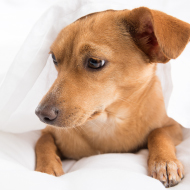
New data shows pattern of disease is beyond expectations
An increase in cases of prolific vomiting in dogs across the UK has been officially confirmed as an outbreak by the Small Animal Veterinary Surveillance Network (SAVSNET).
The announcement comes as a result of statistical analysis by scientists at the University of Lancaster, which shows that the current pattern of gastroenteric disease in dogs in the UK is far beyond what would normally be expected.
The team from the University of Liverpool initially warned of a potential outbreak on 30 January 2020, after it received multiple reports of cases of prolific vomiting in dogs, usually accompanied by diarrhoea, anorexia and lethargy.
Since then responses to an online questionnaire distributed by the organisation have reported somewhat widespread disease throughout England and Wales, particularly in North West and Southern England, with a small number of reported cases originating from Northern Ireland and Scotland.
SAVSNET is working with research teams from the Universities of Lancaster, Bristol and Manchester to pinpoint the cause of the outbreak.
Veterinary surgeons from across the UK seeing cases in practice are being urged to contact the organisation if they are willing to collect and send routine samples, with owner consent, for microbiological testing. SAVSNET has asserted that these samples are vital to fully investigating the aetiology of the outbreak.
For more information, updates and to complete the online questionnaire please visit the SAVSNET website.



 The Veterinary Medicines Directorate (VMD) is inviting applications from veterinary students to attend a one-week extramural studies (EMS) placement in July 2026.
The Veterinary Medicines Directorate (VMD) is inviting applications from veterinary students to attend a one-week extramural studies (EMS) placement in July 2026.